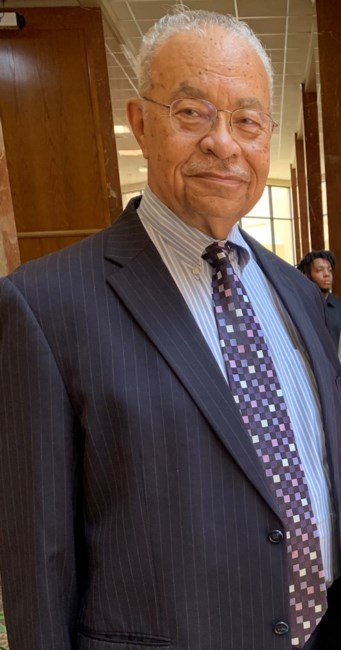
OBITUARY
Curtis Matthew Graves
August 26, 1938 – July 26, 2023

Curtis Matthew Graves, a resident of Tucker, Georgia, died on July 26, 2023 at Emory University Hospital in Atlanta, Georgia. He was born on August 26, 1938 in uptown New Orleans, the son of Fregelio Joseph Graves and Mabel Haydel Graves. He grew up surrounded by a large extended family including parents, grandparents, aunts, uncles, great aunts and uncles, a half-brother, and many cousins. This multigenerational family and the vibrant Creole culture of New Orleans shaped who he was.
Curtis's maternal grandparents lived with him and his parents, but rarely were there only 5 people at their dinner table. Their home was a welcoming place, and friends, relatives, friends of friends, and visiting civil rights lawyers and activists often dined with them. The language spoken at the Graves's dining room table was "adult", and at a young age Curtis was seated at the table and expected to listen and learn. Here he heard the stories of his family and their past; here he learned their values and, gradually, the realities of the Jim Crow South.
In spite of Jim Crow, Curtis had a rich childhood with the best formal education available to an African American child at that time— Catholic grade schools and Xavier Prep. But the world was his classroom too. He hunted, fished, and went shrimping with his dad, cousins and uncles, celebrated special occasions in a family of great cooks; and every summer he worked at Butsy and Buddy's, one of his father's and uncle's service stations and the only black-owned Esso stations in Louisiana. Butsy and Buddy's was a purveyor of the Green Book, a cultural hub for the Creole community of New Orleans, and a major part of Curtis's education in the 40's and 50's. He also attended Bayou Boys State, a leadership camp for African American teenagers where his interest in
Politics was born. After high school, he attended Xavier Univ. before transferring to Texas Southern University, where he joined Kappa Alpha Psi and graduated in 1963 with a degree in business administration. Growing up in a family that taught him about justice and human rights, Curtis found his voice as a civil rights activist at TSU. He participated in sit-ins, marches, and helped found the Progressive Youth Association which played a major role in the peaceful desegregation of Houston.
After college, he served as a bank manager before running for the Texas House of Representatives, where he was elected to represent the 5th district of Houston. It was 1967—for the first time since 1899, the Texas House of Representatives had African American members. Curtis was a memorable figure there, an outspoken advocate for issues that most affect the voiceless: raising minimum wage, eliminating food tax, incentivizing adoption of minority and disabled children. After serving 3 terms in the Texas House, he ran for mayor of Houston and later for the Texas Senate. Losing these races, he was finished with elected office. He worked for the McGovern campaign and then moved his family, including three young children, to Washington D.C. But he maintained a lifelong interest in politics that supported a healthy democracy.
In Washington, he took a job with NASA where he served with distinction for the next 30 years as Director of Educational Programs and then Director of Public Affairs.
Throughout his life Curtis was a devoted father of 3 and eventually, grandfather of 6. He was immensely proud of each of his children and grandchildren and loved visiting them, celebrating special occasions, knowing the details of their daily lives.
In 2003, he retired from NASA and moved to Tucker, GA, where he married Kay Bryant and spent the last 20 years of his life. These were good years. A gifted photographer, he sold his photographs at galleries around the country; he researched his family's history, including as landowners and slaves on the Whitney plantation; he spoke at Black history events. And he served on the boards of La Creole and the Whitney Plantation.
Kay and Curtis loved traveling, friends, and family. Most years they went abroad, and every year they had multiple visits with Kay's family and Curtis's large extended one; they loved holiday dinners, birthday parties, Mardi Gras; every gathering of family or friends was their travel priority. At home they hosted big parties, with Curtis cooking barbecue, gumbo, and spiked bread pudding for 30. Like his mother, grandmothers, and aunts before him, he was a great Creole cook.
In the last few years, more of the family gatherings were funerals and the parties at home were small. In May, Kay and Curtis went back to Venice, their favorite travel destination. Sitting in St. Mark's Square, Curtis looked around and said, "I don't think I'll be here again."
When his brain cancer was diagnosed on July 10, he opted for an aggressive surgery, knowing its outcome was uncertain; he died 12 days later. Curtis was never a halfway guy; in living—and in dying—he went for the gold. But as all of us know, it was we—who loved him and had the privilege of spending parts of our lives with him—we got the gold.
Curtis is survived by his wife, Kay Bryant of Tucker, GA; 3 children he had with his former spouse, Joanne Graves: Gretchen Graves, Christopher Graves (Gwen), and Gizelle Bryant, all of Bethesda, MD; and six grandchildren: Anthony Graves, Justin Graves, Christian Graves, Grace Bryant, Adore Bryant, and Angel Bryant. A private memorial service will be held. In lieu of flowers, please make donations to lacreole.org or whitneyplantation.org, in memory of Curtis Graves.
Fond memories and expressions of sympathy may be shared at www.floralhillsfuneral.com for the Graves family.
Show your support
Add a Memory
Share Obituary
Get Reminders
Services
SHARE OBITUARYSHARE
- GET REMINDERS
v.1.17.0